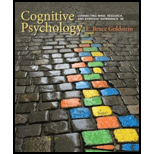
Introduction
Inductive reasoning involves arriving at general conclusions based on specific observations and past experiences. This type of reasoning, using past experiences to predict future consequences, is used frequently by people in their daily lives.
Explanation of Solution
Answer and explanation
The process of arriving at a general conclusion on the basis of specific evidence and observations is known as inductive reasoning. The conclusions are based on prior experiences and one’s observations. However, these conclusions, reached on the basis of inductive arguments, are not always true. Whether a conclusion seems plausible or not is determined by the strength of the inductive argument, which is further influenced by a variety of factors:
1. Representativeness of observations: This refers to the extent to which the argument applies and represents all the members of a category. Arguments that are more representative of the category are stronger than those that take only certain members of the category into account.
2. Number of observations: The number of cases on which the argument is based also influences its strength. The larger the number of cases examined to build an argument, the stronger will be the argument.
3. Quality of observations: Lastly, the quality of the observations or evidence also impacts the strength of the argument, such that the arguments based on scientific and reliable sources and evidence are generally more convincing.
Want to see more full solutions like this?
Chapter 13 Solutions
Cognitive Psychology
- Hi with this unit/ assessment PSY4406 TP4 Report assessment material case stydu Ms Alecia Moore. in the Assessment tool 2 - Trait emotional intelliegence can you provied the results for the test, and the test results for Assessment 3 - Mini International personality item pool. https://www.bartleby.com/docs/psychology/4369920 thanl you, your response is greatly appricatedarrow_forwardWhat are the expectations going into the internship with high school student beahavoir?arrow_forwardWrite a 1,200-1,500-word analysis that describes the characteristics and roles you hope to embody as a counselor and the counselor dispositions that you want to bring with you. You may write in the first person for this assignment. Include the following in your analysis: Your role as a clinical mental health counselor or school counselor in the agency, school, and/or community you serve. Include strategies for collaborating and consulting with behavioral health care professionals. Refer to the importance of certification and licensure related to your role and professional identity. Strategies to develop a counselor identity that fosters leadership, advocacy and provides services as a licensed professional counselor or school counselor for persons with mental health issues. Depending on your program of study, refer to the GCU "SC Professional Dispositions of Learners" or the GCU "Counselor Dispositions" located in the Class Resources when completing this assignment. Consider your…arrow_forward
- what makes yoruba different from other religions or culturesarrow_forwardWhat does the PIC/NIC Analysis focus on from the Performer's Perspective? Consequences Antecedents Behavior X Behavior Yarrow_forwardWhat does the PIC/NIC Analysis focus on from the Performer's Perspective? Consequences Antecedents Behavior X Behavior Yarrow_forward
- The Performance Diagnostic Checklist-Human Services (PDC-HS) is an assessment tool to identify areas of improvement for employee performance within a work environment. For this task, you can complete the PDC-HS as a self-assessment within your work requirements or you can interview a colleague. Describe the performance concernarrow_forwardWhat are three methods for dissemination of information that school counselors can use after watching the YouTube video titled: “Self-care for school counselors” (https://www.youtube.com/watch?v=hvQyjEh1Lmk) by CSCA Executive Director (2020, April 2)? Please write in a narrative format and include citations and references.arrow_forwardWhat are the three most relevant principles school counselors need to be aware of watching the YouTube video titled: “Self-care for school counselors” (https://www.youtube.com/watch?v=hvQyjEh1Lmk) by CSCA Executive Director (2020, April 2))? Please write in a narrative format and include citations and references.arrow_forward
- What are three interventions or programs school counselors can implement in schools after watching the YouTube video titled: “Self-care for school counselors” (https://www.youtube.com/watch?v=hvQyjEh1Lmk) by CSCA Executive Director (2020, April 2))? Please write in a narrative format and include citations and references.arrow_forwardWhat are three professional best practices that school counselors can implement or can recommend in schools after watching the YouTube video titled: “Self-care for school counselors” (https://www.youtube.com/watch?v=hvQyjEh1Lmk) by CSCA Executive Director (2020, April 2))? Please write in a narrative format and include citations and references.arrow_forwardWhat are three strategies school counselors use in schools after watching the YouTube video titled: “Self-care for school counselors” (https://www.youtube.com/watch?v=hvQyjEh1Lmk) by CSCA Executive Director (2020, April 2)? Please write in a narrative format and include citations and references.arrow_forward
 Ciccarelli: Psychology_5 (5th Edition)PsychologyISBN:9780134477961Author:Saundra K. Ciccarelli, J. Noland WhitePublisher:PEARSON
Ciccarelli: Psychology_5 (5th Edition)PsychologyISBN:9780134477961Author:Saundra K. Ciccarelli, J. Noland WhitePublisher:PEARSON Cognitive PsychologyPsychologyISBN:9781337408271Author:Goldstein, E. Bruce.Publisher:Cengage Learning,
Cognitive PsychologyPsychologyISBN:9781337408271Author:Goldstein, E. Bruce.Publisher:Cengage Learning, Introduction to Psychology: Gateways to Mind and ...PsychologyISBN:9781337565691Author:Dennis Coon, John O. Mitterer, Tanya S. MartiniPublisher:Cengage Learning
Introduction to Psychology: Gateways to Mind and ...PsychologyISBN:9781337565691Author:Dennis Coon, John O. Mitterer, Tanya S. MartiniPublisher:Cengage Learning Psychology in Your Life (Second Edition)PsychologyISBN:9780393265156Author:Sarah Grison, Michael GazzanigaPublisher:W. W. Norton & Company
Psychology in Your Life (Second Edition)PsychologyISBN:9780393265156Author:Sarah Grison, Michael GazzanigaPublisher:W. W. Norton & Company Cognitive Psychology: Connecting Mind, Research a...PsychologyISBN:9781285763880Author:E. Bruce GoldsteinPublisher:Cengage Learning
Cognitive Psychology: Connecting Mind, Research a...PsychologyISBN:9781285763880Author:E. Bruce GoldsteinPublisher:Cengage Learning Theories of Personality (MindTap Course List)PsychologyISBN:9781305652958Author:Duane P. Schultz, Sydney Ellen SchultzPublisher:Cengage Learning
Theories of Personality (MindTap Course List)PsychologyISBN:9781305652958Author:Duane P. Schultz, Sydney Ellen SchultzPublisher:Cengage Learning





